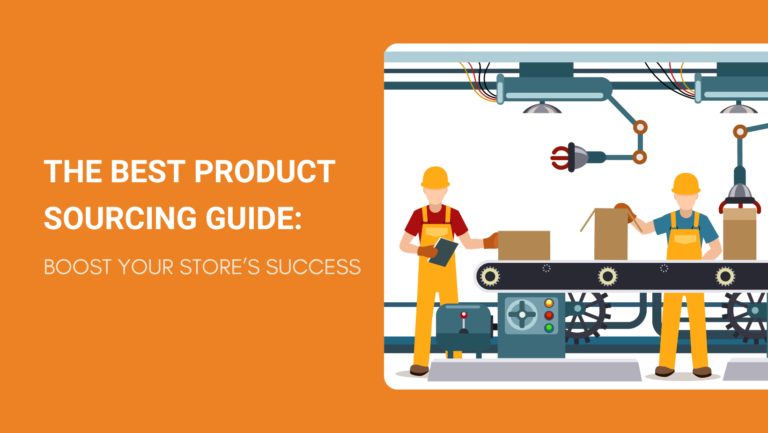Industry stats show that successful product sourcing can increase your profit margins by up to 50%, making it one of the most critical aspects of running an eCommerce business.
Product sourcing isn’t just about finding items to sell; it’s about securing products that meet quality standards and consumer demand.
Whether you’re considering wholesale purchases, dropshipping, or even sourcing from online B2B marketplaces, knowing where and how to find the best suppliers can set your business apart.
In this blog post, you’ll discover various methods for sourcing products. Each method has its pros and cons, and we’ll guide you through selecting the best options for your business needs.
What Is Product Sourcing?

Product sourcing involves finding and acquiring products to sell in your business. This can include searching for manufacturers, wholesalers, or retailers who can provide the items you need at competitive prices.
In the supply chain, product sourcing is crucial for maintaining inventory levels and meeting customer demand. Efficient product sourcing helps businesses secure high-quality products while controlling costs, which directly impacts profitability.
Where to Find Wholesale Product Suppliers?
When sourcing products to sell, it’s vital to know where to find reliable wholesale product suppliers. Aside from various online platforms and websites, below are some common ways to find wholesalers:
Online Search
This is probably the easiest way to find the suppliers. You can write whatever you want on the internet and you will be presented with several solutions.
But how you carry on your research depends upon your skills to reach the best supplier for your business. It is a lengthy task as finding something on the internet depends on multiple factors.
You might miss out on a great supplier who did not even bother to be present on the internet or did not do the right SEO of his website.
The most common methods to find a supplier online are mentioned below.
- Search engines
- Online marketplaces like Alibaba
- Social media (Facebook, Instagram, YouTube, LinkedIn, etc)
How to Use Search Engines
Start by using keywords like “wholesale [product name]” or “bulk [product name] supplier” in search engines such as Google.
Use quotation marks to find exact phrases: “wholesale electronics supplier”. Combine keywords with specific needs, like regions or certifications, to narrow down options.
Use Boolean operators to refine searches. For example, searching “furniture wholesaler” AND “California” will return more specific results. Add terms like “ISO certified” to find quality suppliers.
Physical Visits

You can do market research and visit the wholesale markets physically. You have to find out the local wholesale markets in your country.
If you want to source products from other countries like China, you may consider visiting places like the Yiwu and Guangzhou markets.
Visiting suppliers in person is key for effective product sourcing. These visits allow you to inspect raw materials, verify quality control processes, and ensure the efficiency of manufacturing equipment.
This hands-on approach helps identify potential quality issues early, making sure the final products meet your standards. It’s also an excellent way to establish strong relationships with your suppliers.
How to Plan Your Visit
- Research the Supplier: Before your visit, gather as much information as possible about the supplier. Check their history, reviews, and any recent developments.
- Prepare a Checklist: List everything you need to inspect, from raw materials to final products. This ensures you don’t miss any critical areas.
- Schedule Meetings: Arrange meetings with key personnel, such as production managers and quality control teams. This helps you get a comprehensive understanding of the operations.
When visiting suppliers:
- Be Observant: Use your eyes and ears to assess the supplier’s environment. Look for cleanliness, organization, and efficient use of space.
- Ask Questions: Engage with employees to understand day-to-day operations. Inquire about their processes, challenges, and improvements.
- Document Findings: Take notes and photos to document your observations. This will help you compare different suppliers and make informed decisions.
Effective supplier visits also provide opportunities for cost reduction and performance assessment.
Trade Shows
Attending trade shows can significantly boost your product sourcing efforts. These events offer a platform for discovering new products, networking with suppliers, and staying updated on industry trends.
Benefits of Trade Shows
- Networking: Connect with manufacturers, suppliers, and other industry professionals. Building these relationships can open doors to better deals and exclusive products.
- Product Discovery: Get hands-on experience with new products before they hit the market, allowing you to assess quality and potential.
- Industry Insights: Learn about the latest trends, technologies, and innovations in your sector.
Popular Trade Shows
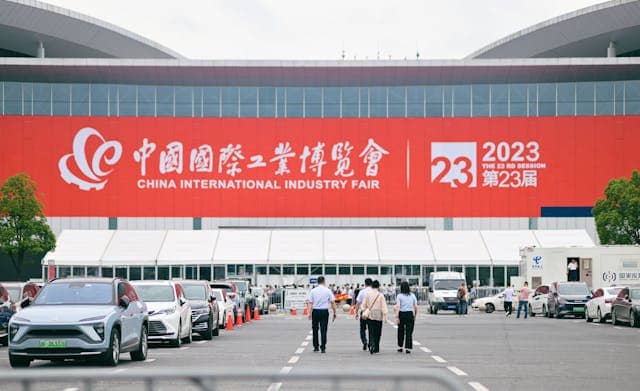
Canton Fair
- When: April 15-24
- Where: Guangzhou, China
- Why Attend: The Canton Fair is one of the largest trade fairs in China, attracting global buyers and sellers. Ideal for sourcing a wide variety of products.
ASD Market Week
- When: Annually
- Where: Las Vegas, USA
- Why Attend: This massive trade show hosts over 1,500 vendors with high-margin goods, from holiday decor to kids’ toys. Great for Amazon sellers.
SOURCING at MAGIC
- When: Twice a year
- Where: Las Vegas, USA
- Why Attend: Focuses on the fashion industry. Perfect for designers looking for partners and new trends in clothing and accessories.
Product Sourcing Companies
Product sourcing companies play a crucial role in connecting businesses with suppliers. They help you find the best sources for products at competitive prices, which can save you both time and money.
These companies handle various tasks, from identifying potential suppliers to negotiating terms and ensuring quality control.
They specialize in finding the best suppliers for your products at the most affordable costs and also provide other services like order fulfillment, product storage, worldwide shipping, etc.
Using a product sourcing company can vastly simplify the complex process of finding the right suppliers. They provide a mix of industry expertise and logistical support, which can help you focus on growing your business.
Product Sourcing Methods With Their Pros And Cons
Different methods of product sourcing can greatly impact your business. Knowing their pros and cons can help you decide which method suits you best.
Product Sourcing from Manufacturers
Acquiring products from direct manufacturers or OEMs is one of the most desired methods of sourcing products. That’s because the retailers are confident about the quality of products and they are sure of getting products at the right prices.
Most manufacturers are always comfortable selling products to retailers with certain business terms and conditions. They also have dedicated sales and marketing departments to deal with buyers.
Having said that, it is not always easy to work with a manufacturer. For example, if you are planning to buy from a Chinese manufacturer, you need to take certain tips and tricks into account to buy direct from a China factory.

Pros
- Lowest prices guaranteed
- No middleman commissions
- Easier to launch your private label business
Cons
- Higher MOQs
- Communication challenges
- Difficult professional rapport
Further Reading:
- How to Get a Product Manufactured 101: A Complete Guide
- Learn How to Contact Chinese Manufacturers Like a Pro: The Insider’s Guide
Product Sourcing from Wholesalers
Wholesale suppliers or wholesalers are specially meant to sell products to the retailers. A wholesale supplier may also be a manufacturer, distributor, or stockist who has acquired products in high quantities.
The main objective of a wholesale supplier is to sell those products to the retailers in smaller batches with MOQs.
For example, if a wholesale supplier has manufactured or acquired 100,000 pieces of one product, he may be willing to sell those items with an MOQ of 100 or 1000 pieces per order.
Pros
- Ready stock available
- Easy reordering for the same products
- Minimum lead times
- Specialized in shipping offering all kinds of shipping Incoterms
Cons
- Limited options for customization if the wholesaler is not the manufacturer
- Limited flexibility in MOQs
- Higher competition with retailers selling the same products
Product Sourcing from Dropshipping Suppliers
Dropshipping is the business model in which a retailer does not acquire the products from the supplier. Rather he tells the supplier to ship the products directly to the customer.
So, if the supplier agrees to dropship products on your behalf, he does not set an MOQ for his products. But the products are offered at a higher price in a dropshipping model as compared to the wholesale model.
Pros
- Hassle-free business
- No warehousing required
- Limited business expenses
- No worries for dead stock
Cons
- Higher costs per product
- Less control over product prices and lead times
- Difficult to compete with retailers who bought in the wholesale model
Product Sourcing from Online B2B Marketplaces
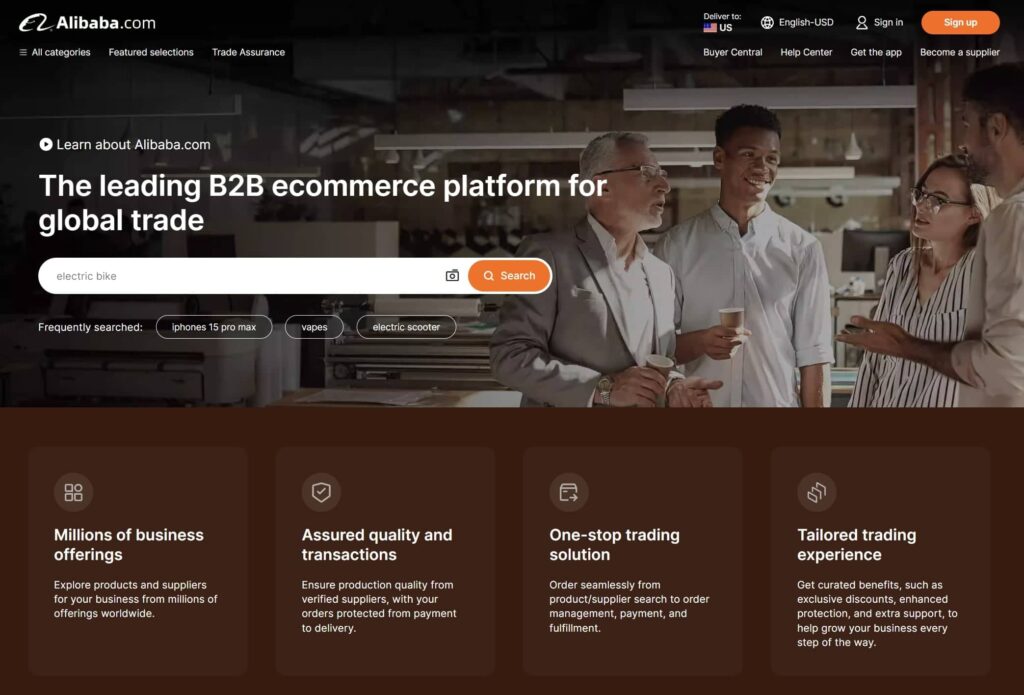
You can also source products from the online e-commerce marketplaces that work on a B2B model. These websites host a variety of wholesale sellers, manufacturers, and other sellers who mostly offer products with MOQs.
The websites like Alibaba, DHgate, Global Sources, etc. have made online product sourcing very easy. It is best to find online marketplaces that are based in China for the best China-made products.
You just visit these online platforms, choose the products and suppliers of your choice, and place orders that are also protected by these platforms.
Pros
- No physical visits required. Easy and remote access to suppliers.
- Multiple suppliers are available in one place.
- Secure payments from platform protections
Cons
- Difficult communications
- Difficult to choose a supplier among many options
Product Sourcing from Sourcing Agents
As discussed earlier, a sourcing agent or a company does everything on your behalf to reach and source the best products from the best suppliers.
You can save a lot of time and focus on other important tasks of your business by hiring an expert sourcing agent at an affordable cost.
Pros
- Time-saving sourcing method
- Easy to communicate your messages to the supplier via a local sourcing agent who understands your language
- Experienced sourcing agent already knows the best suppliers in particular niches.
Cons
- No direct relationship with suppliers (factories, wholesalers, etc.)
- An inexperienced or unreliable sourcing agent can be a nightmare for your business.
Product Sourcing from Closeout & Liquidation Stores
You can also source products from the closeout stores or stores that are after liquidating their excess stock at lower costs.
These stores are either trying to replace their items or planning to close their businesses by selling their remaining stock.
So, if such stores have products from your niche, it would be a good idea to source products from them as they may be offering those products at discounted prices.
You can find these stores online or locally in your country.
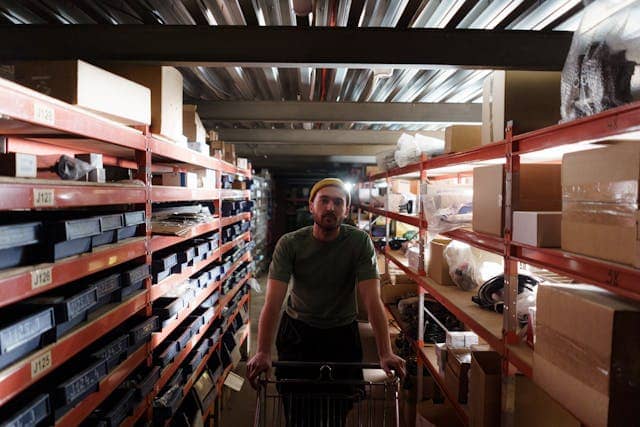
Pros
- Products are available at discounted prices.
- Easy to collaborate and negotiate for bulk order quantities as they want to get rid of their stock.
- Chances to check out products by visiting their warehouses
Cons
- Such stores are limited in number and difficult to find.
- Products may be old or damaged in some cases.
- Limited product variety. You may have to compromise on product specifications and quantities.
Product Sourcing from Existing Retailers
Some small businesses that cannot buy products in large quantities also source products from existing retailers. This especially happens in e-commerce.
Such retailers list the pictures of the products from existing retailers on B2C platforms like Amazon, eBay, Walmart, etc.
They try to sell at a higher price to earn a little profit per sale. They can resell the products on the same platform or can also source from one platform and sell on another.
This is also a form of dropshipping as you don’t have to buy products in advance before having orders.
Pros
- Low startup costs
- No product storage
- Looking at the sales trends in the marketplace, it is easy to select the high-selling products.
Cons
- Difficult selling. Not a long-term business.
- Lower product margins
- Little control over pricing and inventory
- You may lose repeat sales and customers if they find out that your items are overpriced as compared to other sellers.
Factors to Consider When Choosing a Product Sourcing Method
When selecting the right product sourcing method, there are several crucial factors to keep in mind. Some of them are mentioned below:
Business Capital
Your budget plays a significant role in determining the best product sourcing method for your business. If you have limited funds, wholesale sourcing might be a good option as it typically requires a lower investment compared to manufacturing.
On the other hand, if you have substantial capital, you have more flexibility to consider options like manufacturing, which allows for custom products but requires a significant initial investment for design, testing, and production.
Investing in dropshipping can also be beneficial with tighter budgets since it allows you to sell products without purchasing inventory upfront.
Inventory Storage Options
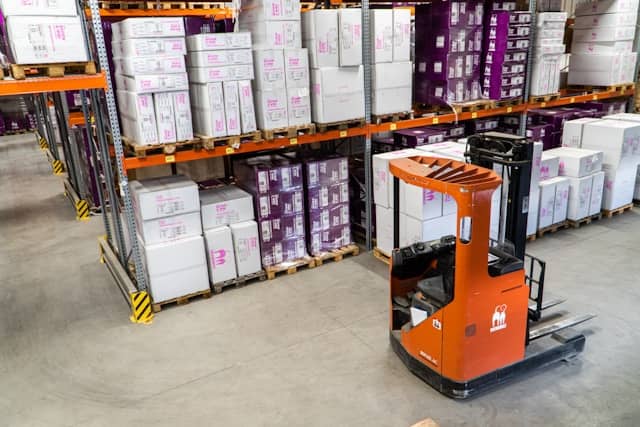
Your storage capabilities can heavily influence your sourcing choices.
Inadequate storage could lead to inventory issues, including overstocking or stockouts, both of which are costly.
If you have your warehouse or you are willing to store your products in third-party warehouses or fulfillment centers, you may opt to source products from the following options.
- Manufacturer
- Wholesaler
- Closeout stores
- Sourcing agents
- Online e-commerce platforms
If you don’t want to store inventory, you can go for the following sourcing methods.
- Dropshipping suppliers
- Sourcing from existing retailers
Product Checking
Quality control is essential to maintain customer satisfaction and brand reputation.
If you are dropshipping or buying wholesale, your ability to check product quality might be limited, making it vital to choose reliable suppliers with a proven track record.
If you are the kind of retailer who likes to check all or majority of the products yourself, you should choose the following sourcing methods.
- Visiting wholesale markets locally or internationally
- Sourcing from a manufacturer or wholesaler who is willing to share a sample for the approval before the order
Branded Selling vs Simple Reselling
Choosing between private labeling and reselling depends on your business objectives.
Branded selling allows you to customize products with your brand name, while simple reselling involves buying generic products from wholesalers or through dropshipping and selling them under the supplier’s branding.
If you are just into the simple reselling retail model without an urge to start your brand, you can source products from the following types of suppliers.
- Wholesale suppliers (both physical and online marketplaces)
- Closeout & liquidation stores
- Dropshipping suppliers
- Existing retailers
On the other hand, if you want to scale your business by running a white-label or private label business, you should consider sourcing from the following suppliers.
- Manufacturers
- Product sourcing agents
Time Allocation to Product Sourcing

Whether you are a small or large business, sourcing products is time-consuming.
Even if you have a separate sourcing department, you can still be unsure whether you have sourced products from the best available supplier.
You also need to be involved in every nitty-gritty of the sourcing process.
For example, if you are planning to buy from China, you have to be abreast with information regarding how to import small quantities from China in the most cost-efficient manner.
So, in this case, the best option is to source a sourcing agent/company.
Successful Product Sourcing in 5 Steps
To source products efficiently, you need to follow a structured process that ensures quality and reliability. This involves thorough research, finding trustworthy suppliers, negotiating terms, ordering samples, and finally approving and placing the order.
Product Research
To identify products for your online store, start with thorough product research.
Use tools like Google Trends, SEMrush, and Jungle Scout to gauge market demand and competition. To increase your chances of success, look for products with a stable or growing trend and minimal competition.
Another effective approach is analyzing sales data from platforms like Amazon and eBay. This data can offer insights into consumer preferences.
Evaluate a product in terms of the following criteria before deciding to source it.
- A large and passionate consumer base for that product
- Your interest and knowledge in that product
- Evaluation of the competition among retailers selling the same products
- Decent profit margins
Finding Suppliers
Once you have identified potential products, the next step is to find reliable suppliers.
Begin by exploring reputable supplier directories like Alibaba, ThomasNet, and Global Sources. These platforms often have verification processes that help you avoid fraudulent suppliers.
Conduct due diligence by checking reviews, verifying business licenses, and even visiting suppliers if possible. This step is crucial as it lays the foundation for a reliable supply chain.

If you are not hiring a sourcing agent and want to find the supplier yourself, you should leave no stone unturned to dig out the best supplier that offers the best quality at an affordable price and MOQ.
You should shortlist 4-5 suppliers so that you can negotiate with all of them to finalize the one that offers the best price, quality, quantity, and services.
Negotiate and Finalize Terms and Conditions
It is advised that you always have room for negotiations with your supplier. You can take quotes from multiple suppliers and ask each other to lower the prices and MOQs as offered by other suppliers.
Further Reading: How to Negotiate a Low MOQ with Chinese Suppliers
Finalize a supplier and agree to terms and conditions. Share all the specifications with your supplier in detail including the color, size, dimensions, packaging, etc.
Set clear obligations and responsibilities for your supplier, especially in shipping and delivery.
For example, if you are new to import business, you can agree on the DDP Incoterms which puts most responsibilities on the supplier.
Order a Sample
Before committing to a large order, always request a sample. This helps verify product quality and allows you to make any necessary adjustments. Most suppliers offer free or discounted samples for potential bulk orders.
Evaluate the sample by testing its functionality, durability, and design. Provide detailed feedback to the supplier to address any issues.
Approve the Sample and Place Order
After approving a satisfactory sample, you can proceed with the bulk order. Ensure clear communication with the supplier and confirm all terms and conditions in a written contract. This minimizes the risk of discrepancies during production and delivery.
Further Reading: How to Source Products to Sell on Amazon in 2023?

FAQs about Product Sourcing
Product sourcing involves identifying high-quality products for sale while managing costs and logistics. It’s crucial for efficient business operations and maximizing profitability.
What Is the Difference between Sourcing and Procurement?
Sourcing focuses on finding and selecting suppliers, ensuring that you get the best quality products at competitive prices.
Procurement, on the other hand, involves the actual process of obtaining the products, including ordering, receiving, and payment.
For example, using product sourcing services can help streamline the supplier selection process, while procurement ensures your inventory is stocked.
What Is Strategic Sourcing and Why Is It Important?
Strategic sourcing refers to the systematic process of optimizing your business procurement. It focuses on devising a strategy to fulfill the gap between demand and supply of any business.
It involves processes like product forecasting, inventory management, and supplier registration for systematic ordering keeping in view the sales trends of a business.
It helps businesses save time in looking for vendors every time they need products.
It also incorporates lead times and prior planning to overcome issues of product shortages and late deliveries during peak times (Oct to Dec).
In contrast to the typical procurement, strategic sourcing emphasizes developing a relationship with competent suppliers rather than searching for the cheapest solutions every time.
The concept of strategic sourcing is very important for the business’s survival. A long-term business cannot afford a shortage of supplies or late shipments.
This idea is growing with wide popularity, especially in e-commerce where retailers like Amazon FBA sellers cannot afford product shortages by following strategic sourcing techniques.
As an example, a typical FBA seller with aggressive strategic sourcing often has one container at the Amazon fulfillment center, one in transit, and one in the ordering process with his supplier.
How to Optimize Product Sourcing Strategy?
You can only optimize your product sourcing strategy once you have devised one for your business.
Every business has different dynamics. The product you are selling has a particular audience, demand patterns, and the reordering cycle based on your sales trends.
So, to optimize your product sourcing strategies, you have to make a specialized sourcing strategy that is tailor-made for your business.
Let’s say you are selling beauty products to a specific audience in the USA via your online store. You would have some organic traffic, and you may intend to get some more traffic by advertising.
You would need to set the sales target yourself keeping in view the dynamics of your audience and the intensity of your marketing campaigns and order accordingly.
If you are planning to sell them through Q4, you may expect some more sales due to the events of Black Friday and the gifting season during Christmas and New Year, etc.
If you are selling seasonal products, you would have to devise a sourcing strategy based on the seasons or before the times of their peak demand.
You need to place an order well before the arrival of the season so that you have the stock ready for selling as soon as the season begins.
For that, you have to calculate the number of items to be ordered. You can forecast this by seeing the previous trends and considering how aggressive your marketing campaigns will be.
You have to calculate the shipping time by discussing it with your supplier and placing the order keeping the grace period of 15 days in the case of importing products from China to the USA via sea.
Conclusion: Streamlining Your Product Sourcing
Product sourcing is essential for businesses seeking to offer high-quality goods at competitive prices. Understanding the steps and considerations involved can significantly improve your business outcomes.
By recognizing the importance of selecting the right suppliers, negotiating effectively, and managing logistics, you can streamline your sourcing process.
To take your product sourcing to the next level, consider partnering with an expert China sourcing agent here at NicheSources who can tailor services to your unique needs. This partnership will help you navigate the complexities of international trade efficiently.
Request a free quote today and start achieving your business goals with ease.
